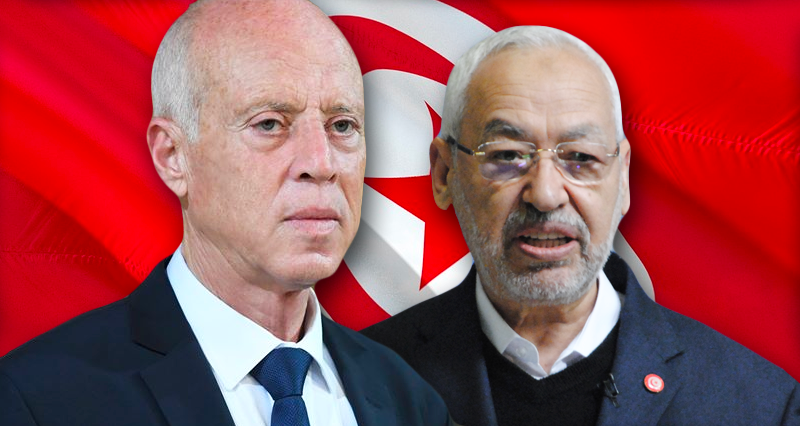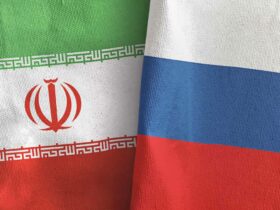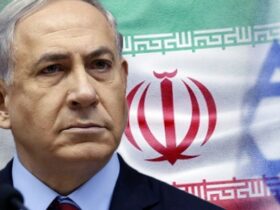The events in Tunisia are discussed throughout West Asia. Turkey’s Vatan Party, which has extended relations to regional countries including Syria, Lebanon and Egypt, has organized a meeting within its Office of International Relations, where the latest events in Tunisia and its possible impacts on Turkey were discussed in detail.
At the meeting Professor Cuneyt Akalin, Dr. Mehmet Perincek and Dogan Duyar made presentations, concluding that Tunisia witnessed a conflict between Turkey, Russia and China are together against the West in Africa.
United World International expert Dr. Mehmet Perincek said that it is absolutely impossible to explain today’s global status and the events based on the confrontations from back in the 2000s. While stressing the changing nature of the government, Perincek said, “We need to question the events in Tunisia or in other parts of the world, not with the realities of the 2000s, but with the realities of this decade, and then arrive to conclusions.”
Africa has become an important theater of global polarization
While stating that Africa has recently become one of the important fields of global polarization once again, Mehmet Perincek said, “Especially the Libyan crisis, the polarization in North Africa and the Sahel region in general have become some of the most important spaces of global polarization. When announcing the US withdrawal from Afghanistan, Biden said: ‘We are leaving Afghanistan because there are other important points in the world that we are going to take care of. One of them is the Middle East, and the second is Africa’. Therefore, one of the most important points which the imperialist forces now focus on is Africa.”
Turkey, Russia and China against the West in Africa
While explaining the recent polarization points in Africa, Perincek stated “When we examine this situation with Turkey at the hand, there has been three major obstacles for the imperialist forces in the last five years. From the point of view of North, Central or South African regions, the United States, France and the UAE are against the bloc of Turkey, Russia and China”. Underlining that China has been economically active in Africa recently, Perincek also stressed that Turkey has increased its influence over Africa and especially in Libya. Perincek stated that Recep Tayyip Erdogan is the President that has made the most visits to Africa in Turkish history and Turkey has opened more than twenty diplomatic missions in the last five or six years, as a result of this. Russia on the other hand, has further fortified its existing military presence in the region, he stated.
A decisive conflict
Emphasizing that Turkey, China and Russia are the three important powers in the field of economy, politics and military in Africa, and that these countries will be very influential in determining the future of Africa, Perincek said: “All it matters is the importance of who will come out dominant from Tunisia or from Africa as a whole. America, France and the UAE are on one side. Will these countries prevail, or will it be the bloc of Turkey, Russia and China, whose interests coincide even if there is not a solid alliance between them?”
We have to evaluate these events from today’s realities
Saying that the events in Tunisia should be evaluated through the realities of 2021, Perincek pointed out the undercover support of the West, and the open support of the UAE and Saudi Arabia, in the changing situation in Tunisia: “All these statements very clearly show that the status quo is in their interests”. While stating that all of Turkey’s gains in Libya had been achieved with the cooperation of those powers who overthrew Ghaddafi, Perincek stressed that the poles had changed since then: “If we were to evaluate the situation in Libya according to the conditions of 2010s, we should have cheered over a possible Haftar overthrow of the GNA today. Therefore, the overthrow of the Muslim Brotherhood alone does not mean anything. It is also necessary to clearly examine what stance will the successors take or which programs they have.”
Russia takes a neutral stance
Stating that Russia is taking a neutral stance to the events taking place in Tunisia, Perincek said that this is quite normal. Stressing that Russia has no influence in Tunisia and has not made either a positive or a negative statement in establishing relations with the new government, Perincek said “Russia considers this situation in terms of its own interests in Africa. There are also some who see this issue as a mere rivalry between Turkey and the UAE”. Perincek also stated that this move was also made against Qatar, which is an ally of Turkey.
According to Perincek, the true nature of the newly formed government in Tunisia will be clear in the near future, and that it is necessary to avoid very optimistic assessments early on. However, Perincek stressed that “creating a new case of Egypt”, i.e., another country where Ankara has no active diplomatic relations to, would be very harmful to the Turkish influence in Africa, and that constructive dialogue channels should be made and the region should not be left to the hands of the United States, France, the UAE and Saudi Arabia.
Turkey’s allies in Libya: A Pro-Boumédiène and Pro-Bourguiba government in Tunisia
Dogan Duyar, who lived in Algeria for many years and has been closely following the events in the region, has said that “The Pro-Boumédiène and Pro-Bourguiba governments that have been on the rise in Algeria and Tunisia, will further strengthen Turkish regional security in the Eastern Mediterranean, and particularly in Libya,” at the Vatan Party’s Office of International Relations meeting on Tunisia. Some of the points of Duyar’s speech at the meeting are as follows:
“The new Pro-Bourguiba government which has strengthened its position in Tunisia on July 25th, will bring its relations with Turkey to a full cooperation, together with the government that supports their founding leader Boumédiène, which came to power in Algeria in 2020.”
The incompetence of the Muslim Brotherhood
“Let us ask this first: Is there any chance that a political party that has ties to the Muslim Brotherhood, ever get in power in Libya’s neighbors such as Algeria or Tunisia? No, there is not.”
“In Algeria, parties close to the Muslim Brotherhood have not been able to get to power since three decades. They did not get beyond being a part of the coalition government under the overthrown President Bouteflika, who leaned relatively closer to the West.”
“And during the Arab spring of 2010-2011 in Algeria, they have hit their rock bottom. Since the Algerian people have given 150 thousand of their citizens as martyrs, to the Western-backed counterrevolutions in the early 1990s, they, in their own words, have gained an immunity against destabilization and have proven this in the 2012 elections.”
“In the elections, the turnout was highest, and as a response to the efforts to undermine the state itself, the country’s founding party National Liberation Front (FLN), has won by a landslide and the Muslim Brotherhood’s vote has plummeted to only three percent. A similar process is now taking place in Tunisia.”
“The votes of the government which started from around forty percent during the peak of the Arab Spring, have fallen down to ten percent in the last Presidential elections. This means that they have lost the faith of the people in their ten-year rule.”
“While the Assembly Speaker Ghannouchi’s Ennahda Party, which represented the Muslim Brotherhood in Tunisia, has held both the Presidency and Prime Ministry from 2011 to 2014, it had to share the office of the Presidency and from 2014 to 2019, and finally in 2019 it was eliminated to go for a second round, because of gaining only ten percent of the votes in the Presidential elections.”
“The position it has taken as the majority party in the Parliament with a twenty-five percent, and the coalition governments established by the western-backed so-called “leftist” parties, are seen by the Tunisian people as the main responsible for the destruction of the country in the past decade, and now Ennahda party offices are being targeted by the public, where a health crisis due to Covid-19 is still in place.”
The flawless cooperation of the Pro-Boumédiène government with Turkey in Libya
Duyar stressed “The cooperation of these countries with Turkey in Libya has increased, under the Pro-Boumédiène and Pro-Bourgiba governments” and added:
“During the Pro-Boumédiène government, which was established in Algeria in 2020, the military cooperation with Turkey in Libya was largely applauded to.”
“President Tebboune announced the new orientation in his country to the world through the French media, that wishes to visit Russia, Turkey and Qatar at first.”
“Algeria returned back to the program of ensuring the integrity of the country and ensuring the needs of the people, with the revolution that was made in cooperation with the Army and the Nation in February 22nd 1919, and overthrew the four decades of French rule. A return to the Boumédiène period of 1962-1978 had begun. In 1978, all development plans started to be put on the national agenda one after another.”
It took a year to establish a government after Revolution of February 22nd. When the government could be formed in January 2020, Haftar had already besieged Tripoli in Libya.
Algeria, which has a 982km border with Libya, has provided an undercover military aid to Tripoli, which was not widely mentioned at the beginning of 2019.
“When the Pro-Boumédiène government convened the Security High Council at the end of January, and announced that their red line is at Tripoli, the retired General Abdelaziz Mecahed, the former Head of the Security and Military Directorate of the Presidency, turned against Haftar from the frontlines.
The military exercise on the Libyan border in mid-2020 was a message sent to Haftar.
“While the article of deploying troops abroad was amended in the constitution after a referendum, the Pro-Boumédiène government has taken steps towards a security and a production revolution at home, while also taking steps on border security, military and economic cooperation in neighboring countries such as Libya, Mali and Niger.”
A longing for the Bourgiba and Ben Ali Periods
“The new Pro-Bourgiba-like government being installed in Tunisia is also expected to enhance its cooperation in Libya, together with Turkey and Algeria,” Duyar said, adding “The most prominent demand in all African countries is the full sovereignty of the nation, security and a production revolution. The desire for full sovereignty is described with the words of peace and stability in the eyes of the people themselves”.
“Anyone who visited Tunisia will know that until the Arab Spring, millions of tourists, including 2 million Algerians, would visit Tunisia because they found it peaceful and safe”.
“The Arab Spring broke this peace and safety. The public corruption has also been plummeting in the 10 years of Muslim Brotherhood rule. The longing for the Period of Burgiba and Ben Ali has heavily increased”.
The historical opposition of nationalist, populist and anti-Israel ‘Robespierre’
“The Tunisian people has shown their longing for the Bourgiba era, by electing a professor of constitutional law Kais Saied, known as the Tunisian ‘Robespierre’, who has a nationalist, populist, anti-Israel and anti-homosexuality stance, with a seventy-three percent of the popular vote in the 2019 Presidential elections.
This Pro-Bourgiba President has been having problems with the governments led by Ghannouchi’s Ennahda party, since he took office on 23 October 2019.
The Arab Spring coalitions that were formed one by one have not been responsive to the needs of their peoples. When a solution has not come out, despite the change of the Prime Minister and cabinets every six months, the historic decision was made on the National Day of July 25th. The sleeves were rolled up once more, for a government that would respond to the needs of the people and to turn Tunisia back to itself, on the basis of legitimacy.”
A natural ally to Tunisia and to Tripoli
“As did Algeria, the Tunisian President, who took office at the end of 2019, had faced with the reality of Haftar in his first days in office, who was moving his troops toward Tripoli.
While Algeria borders with the deserts of Libya in the Fezzan region, Tunisia’s 459km border with Libya is at the doorstep of the Tripoli region. The Cyrenaica or Tobruk regions, where Haftar is more active, are much further away in terms of economic and social relations.
Apart from coming from the same cultural roots, Tunisia declared by the President himself that it recognized the UN-recognized government of Tripoli in Libya and distanced itself from Haftar.
President Said hosted his counterpart Erdogan in Tunisia with Fayez Al-Sarraj, president of the Libyan Government of National Accord (GNA), in early 2020. Therefore he has shown Turkey that he is on the same axis as the Sarraj government and Algeria concerning Haftar.”
“The Pro-Bourgiba President expressed his desire to develop the cooperation in all areas, when he went to Tripoli in March 2021.
It is stated that Turkey-Tunisia relations will progress to a perfect level as it is in Algeria, during the period of the government that still follow the doctrine of Bourgiba, who expressed his admirations to Ataturk and to the Kemalist Revolution at every opportunity since the 1920s.”
Tunisia cannot act alone
Professor Cuneyt Akalin said in a statement that the struggle in Turkey and Tunisia are somewhat similar, but that Turkey is a larger country with a population of 80 million and that Tunisia is a smaller country where almost all of its economy depends on tourism. Therefore, he said it was still not known how long Tunisia could resist. Akalin emphasized in another point that the Tunisian elite is largely under a heavy French influence and stressed that the person, whom President Said will appoint as the Prime Minister, is educated in France. Akalin noted that, at a Teachers’ Union meeting in Tunisia, “They almost cheered on PKK striking on the Syrian Army” noting that some of the union members were heavily pro-Western on such Syria-related issues. With this at hand, emphasizing that Tunisia is a much smaller country that cannot act alone, Akalin stated that Tunisia, which is also in a very difficult economic situation, was also heavily affected during the pandemic.
Turkey must act rational
While saying that Turkey should act rational regarding the events taking place in Tunisia, and that that he personally does not agree on the dilemma of Ghannouchi being a puppet of imperialism and the current President being a defender of the nation-state, when it comes to the polarization between the President and the overthrown government.
Ikhwan has avoided violence
Commenting on the Ikhwan, Akalin stated that the Muslim Brotherhood resembled the early periods of the Turkish AKP. Noting that they organized themselves among the poorer populations and are heavily involved in social movements, Akalin stressed that Ikhwan avoids violent actions. Akalin said that the statements Ghannouchi “We are not in a struggle for a sharia state. We need a state with the rule of law,” during the referendum, had also caused debates in Turkey.
Erdogan tried to establish good relations
Stressing that the French influence in Tunisia should be carefully examined, Akalin said he expected an agreement with the IMF in the near future and a coalition to be formed within a month of the latest dismiss of the government. Stating that it is important for Turkey to be calm about this issue, Akalin noted that Erdogan had previously tried to establish some good relations with the former Tunisian President Es-Sebsi, who died in 2019 and was mostly known for his largely secular identity.

















Leave a Reply